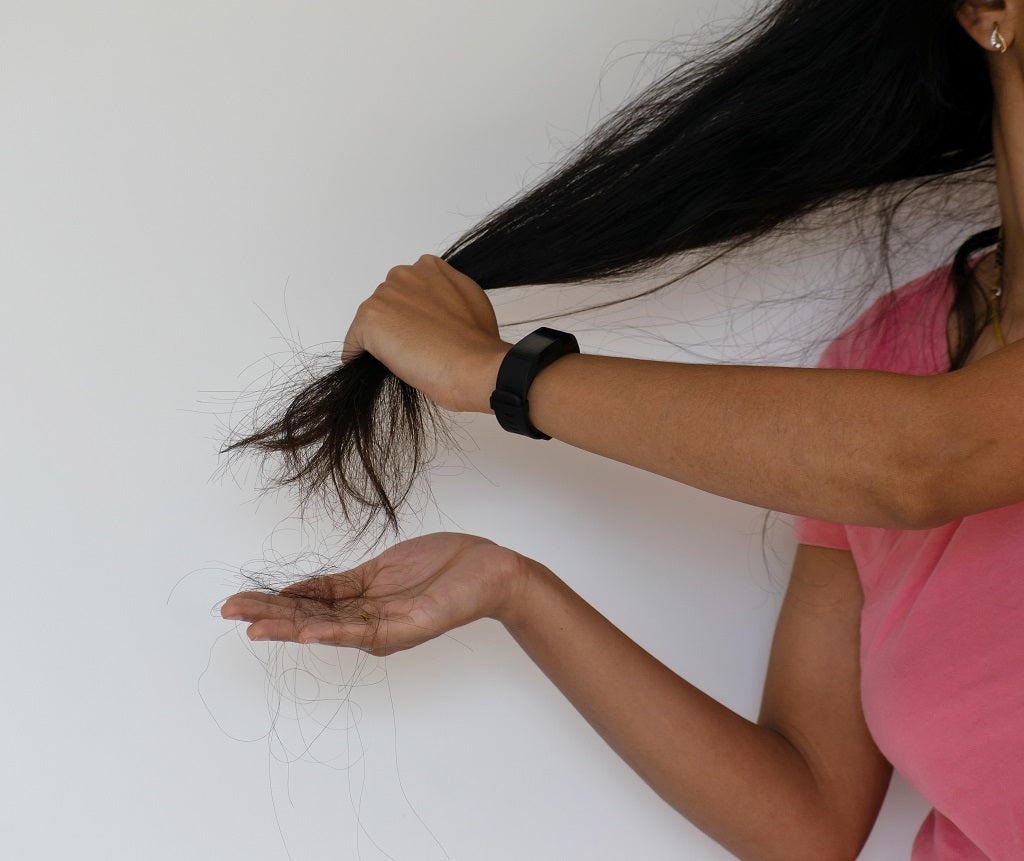Winter weather can be a bliss - cozy layers of clothing, lit fireplaces and watching Netflix binges with a hot cup of cocoa. Ahh, Life is so beautiful! But winter weather has some downsides, particularly concerning your skin and hair. The cold winter months are the biggest enemy of your skin. It's certainly not kind to your hair. The cold arid winter weather can rob your hair of its natural oil, making it look dull, dry, and brittle, leaving your scalp dry and flaky leading to various hair concerns such as dandruff and split ends.
We are here with solutions to your winter hair problems. Your current haircare routine may not be enough to keep your hair well-nourished and hydrated during winters. Don't let winter be the end of beautiful, healthy-looking locks - learn how to tackle common winter hair problems in this blog.
What Causes Winter Hair Problems?

The cold winter weather can be the beginning of various hair care problems. To defend your hair from the harsh, cold winters, you should know, what are the factors that contribute to hair problems during the winter months:
- Cold, Dry Air: The cold, arid air outside and the dry air from indoor heating systems can strip the hair of its natural oils, leading to dryness and frizz.
- Use Of Hat Or Scarfs For Covering Your Head: Wearing hats and other head coverings can make your hair flat and lifeless.
- Static Electricity: The dry air can cause static electricity, leading to flyaways and making the hair more difficult to manage.
- Changes In Humidity: The low humidity levels in winters can make your hair dry and brittle.
- Changes In Haircare Routine: Some people may switch to a different haircare routine in the winters. But using harsh haircare products can lead to whole new hair problems.
These factors are attributed to your winter hair woes. Heat styling can also contribute to the same.
Also Read : Care For your Gorgeous Hair This Winter With These Perfect Tips!
Common Winter Hair Problems & How To Fix Them
During winter weather, your hair behaves unruly, but there are ways to tame your dry, frizzy mane. Here’re the common winter hair problems along with various tricks to fix them.
1. Dryness and Frizz
Cold, dry air outside and heaters indoors can strip the hair of its natural oils, leading to dry hair and frizz. Apart from this, hot water showers, which can give you some respite from the chilling cold weather, can be hazardous to your hair. Using styling tools can wreak havoc on your hair, making it dry, frizzy, brittle, and more prone to breakage.
How To Fix It?
To help prevent dry and frizzy hair in the winter, try to avoid hot water when washing your hair. Use lukewarm or cold water instead. Avoid using hot styling tools, use a mild shampoo and conditioner. You can also use a leave-in conditioner or hydrating natural oil such as Argan Oil to add moisture to your hair. Additionally, try to limit your use of hats and scarves, or choose ones made of natural, breathable materials. For taming your dry, frizzy curls, you can use curl mist on your damp curls which can add life to your dull, lifeless curls.
Also Read : 15 Tested Home Remedies For Frizzy Hair
MOROCCAN ARGAN OIL, COLD PRESSED ORGANIC, 100ML
- Great for CURLY HAIR & FRIZZY OR DRY HAIR.
- Regulates sebum and controls ACNE BREAKOUTS.
- Vitamin E & anti-oxidant rich – combats the SIGNS OF AGEING.
- Hydrates NAILS & LIPS
ANVEYA CURLS HAIR MIST,100ML
- Specially crafted for Indian curly hair
- Reduces frizz & adds shine
- Gives perfect structure to curls
- Promotes prolonged hydration
- Promotes thermal protection
2. Breakage
Cold weather can cause the hair to become more brittle, making it more prone to breakage. When hair is exposed to cold temperatures, the hair cuticle can get weak and damaged, leading to breakage. Moreover, cold weather can also cause hair breakage by tangling, too. When the hair is tangled, it is more prone to breakage while brushing or styling, especially if the tangles are not carefully and gently removed.
How To Fix It
A deep conditioner or an intense hydrating mask can help to control hair breakage. Always keep your hair covered when going out with a hat or scarf.
3. Static
Static electricity in the air can cause flyaways and make the hair more difficult to manage. The air is dry during cold days, and your hair can pick static.
How To Fix It?
Keep your hair well-hydrated to combat winter hair dryness. That means you should switch to haircare products that provide intense hydration to your scalp and strands. You can use Anveya's Hydrate & Nourish Hair Bae Serum. You can also use an ionic or tourmaline hair dryer that doesn't rob your hair of its moisture like ordinary dryers. Apply a hand cream between your palms and then apply it over your hair's staticky strands to soothe them while you sleep on silk pillows because silk retains moisture, while cotton absorbs it.
ANVEYA HAIR BAE HAIR SERUM

• Deeply Hydrates
• Reduces Hair Breakage
• Strengthens Cuticles & Increases Resistance
• Reduces Frizz By 11%
4. Dandruff
Cold, dry air can increase dandruff as the scalp becomes dry and flaky. Scalp dryness can also lead to inflammation, causing dandruff.
How To Fix It?
Avoid shampooing your hair frequently, as it can dry your scalp. Instead, use a cleansing conditioner to cleanse your scalp and hair without stripping your hair's natural moisture. Avoid using hot water to wash the hair, as hot water can deprive the scalp of its natural oils.
Add a few drops of coconut oil or olive oil to your favorite hair mask to enhance its haircare benefits. Coconut oil's antifungal and antimicrobial property fights the fungi responsible for causing dandruff, thus maintaining a healthy scalp and preventing dandruff.
Also Read : Everything You Need To Know About Dandruff Is Right Here!
5. Hat Hair
Wearing a hat or scarf during winter can help protect your hair from the dry, cold air and prevent it from becoming damaged. If the scarf or hat is not worn properly, it can cause tangles and knots, leading to hair breakage when the hat or scarf is removed.
Another way that a hat or scarf can damage your hair is by causing breakage at the hairline. If the hat or scarf is too tight or is not placed on the head correctly, it can put pressure on the hairline and cause the hair to break or snap.
How To Fix It?
To help prevent damage to your hair when wearing a hat or scarf, it is important to be gentle when placing the hat or scarf on your head and to avoid pulling or tugging on the hair. Choose a hat or scarf that is not too tight and is made from a soft, smooth fabric. Avoid pulling the hair while removing the scarf to avoid breakage. Hats or scarves can absorb the moisture from your hair, making it dry and brittle. Make sure your haircare product covers up for the lost moisture.
Winter weather can be fun if you know how to take care of your hair. This winter, keep your mane in top shape by following these hair care tips. Using the right haircare products can change your haircare game, improving your hair's texture and appearance.
Disclaimer: All the content on anveya.com/blogs is solely for information. It is not intended to be a substitute for professional medical advice, diagnosis or treatment. Always seek the advice of your physician or a qualified health care provider. The information, suggestion or remedies mentioned on this site are provided without warranty of any kind, whether express or implied.





